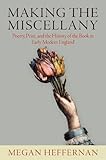Making the Miscellany : Poetry, Print, and the History of the Book in Early Modern England / Megan Heffernan.
Material type: TextSeries: Published in cooperation with Folger Shakespeare LibraryPublisher: Philadelphia : University of Pennsylvania Press, [2021]Copyright date: ©2021Description: 1 online resource (336 p.) : 33 illusContent type:
TextSeries: Published in cooperation with Folger Shakespeare LibraryPublisher: Philadelphia : University of Pennsylvania Press, [2021]Copyright date: ©2021Description: 1 online resource (336 p.) : 33 illusContent type: - 9780812298024
- Book design -- England -- History -- 16th century
- Book design -- England -- History -- 17th century
- English poetry -- Early modern, 1500-1700 -- History and criticism
- Poetry -- Collections -- History and criticism
- Poetry -- Collections -- Publishing -- England -- History -- 16th century
- Poetry -- Collections -- Publishing -- England -- History -- 17th century
- Literature (Scholarly)
- LITERARY CRITICISM / European / English, Irish, Scottish, Welsh
- Cultural Studies
- Literature
- 821.3 23
- PR531 .M35 2021
- online - DeGruyter
| Item type | Current library | Call number | URL | Status | Notes | Barcode | |
|---|---|---|---|---|---|---|---|
 eBook
eBook
|
Biblioteca "Angelicum" Pont. Univ. S.Tommaso d'Aquino Nuvola online | online - DeGruyter (Browse shelf(Opens below)) | Online access | Not for loan (Accesso limitato) | Accesso per gli utenti autorizzati / Access for authorized users | (dgr)9780812298024 |
Frontmatter -- Contents -- Note on Transcriptions -- Introduction. Delight in Disorder: The Miscellany as History -- Chapter 1. Plain Parcels: The Poetics of Compiling in Tottel’s Songes and Sonettes -- Chapter 2. Stationers’ Figures: Mixed Forms and Material Poetics -- Chapter 3. Gascoigne’s Inventions: Inference and Compiled Form -- Chapter 4. These Ensuing Sonnets: Genre and Mediation After Sidney -- Chapter 5. Books Called Poems: Authorship and the Miscellany -- Coda. Shakespeare’s Miscellanies: The Poetic History of the Book -- Notes -- Selected Bibliography -- Index -- Acknowledgments
restricted access online access with authorization star
http://purl.org/coar/access_right/c_16ec
In Making the Miscellany Megan Heffernan examines the poetic design of early modern printed books and explores how volumes of compiled poems, which have always existed in practice, responded to media change in sixteenth- and seventeenth-century England. Heffernan's focus is not only the material organization of printed poetry, but also how those conventions and innovations of arrangement contributed to vernacular poetic craft, the consolidation of ideals of individual authorship, and centuries of literary history.The arrangement of printed compilations contains a largely unstudied and undertheorized archive of poetic form, Heffernan argues. In an evolving system of textual transmission, compilers were experimenting with how to contain individual poems within larger volumes. By paying attention to how they navigated and shaped the exchanges between poems and their organization, she reveals how we can witness the basic power of imaginative writing over the material text.Making the Miscellany is also a study of how this history of textual design has been differently told by the distinct disciplines of bibliography or book history and literary studies, each of which has handled—and obscured—the formal qualities of early modern poetry compilations and the practices that produced them. Revisiting these editorial and critical approaches, this book recovers a moment when compilers, poets, and readers were alert to a poetics of organization that exceeded the limits of the individual poem.
Mode of access: Internet via World Wide Web.
In English.
Description based on online resource; title from PDF title page (publisher's Web site, viewed 25. Jun 2024)


